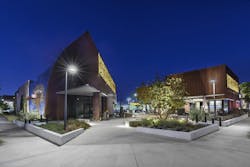How shopping centers can foster strong community connections
Developers are increasingly prioritizing community-centric design principles to create spaces that not only cater to the diverse needs of local residents but also foster a sense of belonging and connection. By curating a diverse mix of retail, dining, entertainment, and recreational offerings, shopping centers can serve as gathering points where communities come together to shop, dine, socialize, and participate in a variety of activities.
An emerging trend in the retail industry indicates that consumers prefer shopping at centers that offer a mix of retail, dining, and entertainment options, signaling a growing demand for experiential shopping experiences. Moreover, it’s observed that consumers are more likely to visit a shopping mall that hosts community events and activities, highlighting the importance of community engagement in driving foot traffic and sales.
One exemplary case study of a community-centric shopping center is Freedom Plaza in Los Angeles. Developed by Primestor, Freedom Plaza was designed to be a reflection of the people of Watts, Calif., and to serve as a community-centric gathering space. This is reflected through an authentic and aspirational design which incorporates the culture of Watts in the architecture, with a major focus on the neighborhood center’s community spaces and gathering areas.
1. Shopping malls can build strong community connections through community events
While creating spaces for the community to gather is certainly important, for community-centric retail strategies to be truly effective developers and retailers need to actively make use of those spaces through community events.
Community events play a crucial role in bringing people together and fostering a sense of community spirit. Retailers are increasingly leveraging events such as farmers’ markets, street fairs, and cultural festivals to engage with local residents and create memorable experiences.
According to research by Eventbrite, 78% of Millennial consumers are more likely to be loyal to a brand that hosts events, underscoring the importance of experiential marketing in building customer relationships.
In addition to fostering gathering space for community groups, Freedom Plaza hosts an impressive slate of events, including summer events for the community’s kids, holiday events, block parties, and live music. Events are advertised on Freedom Plaza’s website and Primestor’s social media pages so community members are aware of each event and can experience them even if they weren’t able to attend.
2. Retail developments can partner with local artisans and musicians
Collaborating with local artisans, makers, and craftsmen is another effective way for retailers to forge connections with local communities and differentiate themselves from competitors. By featuring locally made products and artists, retailers not only support local economies and artisans but also appeal to consumers’ desire for authenticity and uniqueness.
As part of their event series, Freedom Plaza hosts Jazz Fridays featuring local musicians. In addition, open mic nights and writers’ workshops allow local artists to hone their craft and share their art with the community. Freedom Plaza also supports local artists through its very design. The neighborhood center features murals throughout, each painted by a local artist and holding significance to the community and its culture.
3. Offer support for charitable causes within shopping center event spaces
Aligning with charitable causes and giving back to the community are cornerstones of many retailers’ corporate social responsibility initiatives. By supporting local nonprofits, charities, and social causes, retailers demonstrate their commitment to making a positive impact beyond their bottom line.
Many of the events hosted by Freedom Plaza are about more than simply entertainment and feature some aspect of giving. Whether it be a backpack giveaway during back-to-school season, a turkey drive at Thanksgiving, or a toy drive at Christmas, Primestor understands that for its neighborhood centers to thrive, the neighborhoods they serve need to thrive as well.
Community-centric strategies are reshaping the retail landscape and redefining the role of shopping centers and retailers in local communities. By prioritizing community engagement, hosting events, partnering with local artisans, and supporting charitable causes, retailers and shopping center developers can create vibrant, inclusive spaces that serve as focal points for community life.
As consumers increasingly seek authentic, meaningful experiences, community-centric retail development offers a promising avenue for driving foot traffic, fostering loyalty, and building stronger connections with local residents.
Related content: Check out BD+C's 2023 Retail Giants Rankings
- Top 140 Retail Sector Architecture and AE Firms
- Top 75 Retail Sector Engineering and EA Firms
- Top 80 Retail Sector Contractors and CM Firms
